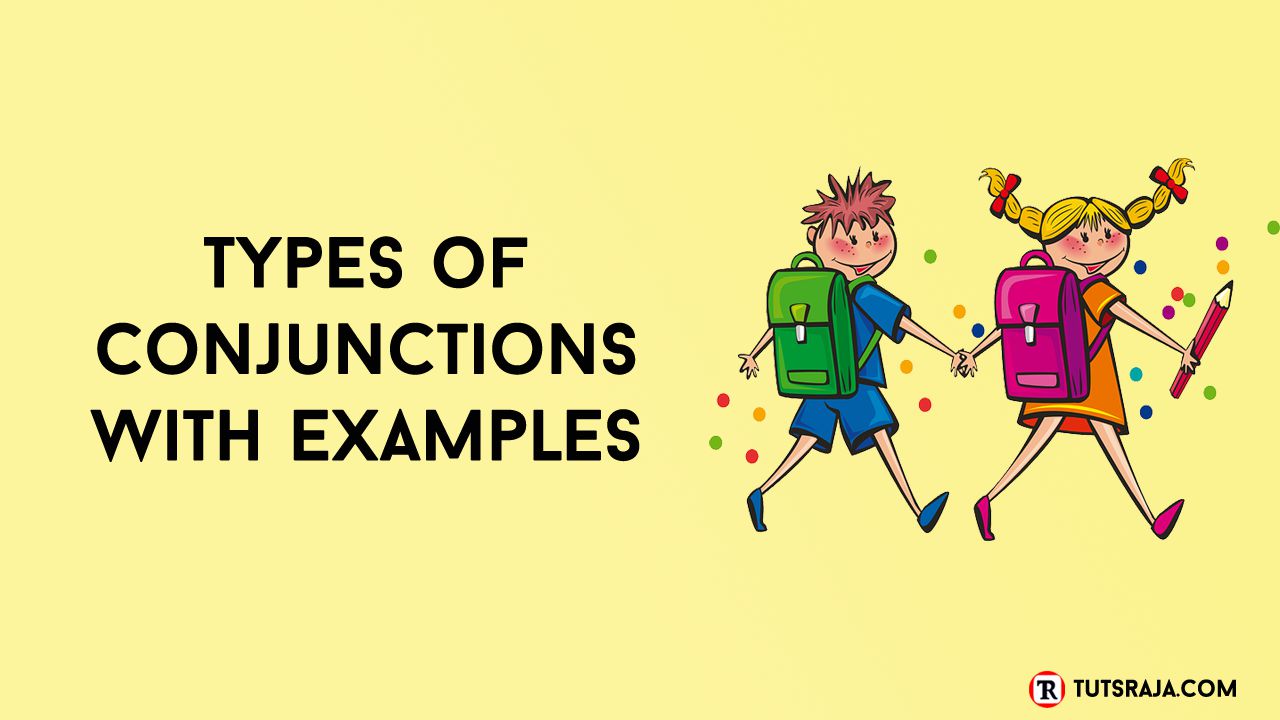
Definition of Conjunction:
The conjunction is the part of speech used as a joiner for words, phrases, or clauses in a particular sentence. The conjunction joins different parts of speeches together. Different kinds of conjunctions join different kinds of grammatical structures.
Here is a Conjunctions List,1. Coordinating Conjunction, 2. Subordinating Conjunction, 3. Correlative Conjunction
Note: Click on show/hide button to show index of the content.
Nouns with Examples
1. Coordinating Conjunction:
Coordination conjunctions are most common and simplest. It joins words, phrases, and clauses as an equal grammatical component. Coordinating conjunctions are called as coordinators.
Coordinating conjunctions connect two words or groups of words with similar values. They may connect two words, two phrases, two independent clauses or two dependent clauses.
coordinating conjunctions adds words to words, phrases to phrases, classes to clauses. between items joined, not at the beginning or end.
a) Coordination Conjunction Joins Two Equal Parts of a Sentence:
- Word + word
- Phrase + phrase
- Clause + clause
- Independent clause + independent clause
b) Examples of Connecting Two Words:
- Raja and Rani stayed up all night practicing their guitars.
- She likes ice cream and juice.
c) Examples of Connecting Two Phrases:
- The squirrel scurried up the tree trunk and onto a low branch.
- He may be in the room or on the roof.
d) Examples of Connecting Two Clauses:
- Several managers sat with their backs to us, and I could almost hear them snickering at us lowly workers.
- What you do and what you listen to sitting alone.
e) Examples of Two Independent Clauses:
- We can hardly wait to see the movie.
f) Examples of Joining Two Words of the Same Importance:
- She likes pizza and burger. (pizza and burger)
- I bought a bat and a ball. (bat and ball)
- He may come by bike or car. (bike or car)
The conjunction joins two independent clauses. Independent clause is a clause which can stand alone as a sentence and have the complete thought on its own.
E.g.- I called him but he didn’t receive my call.
- I advised him to quit smoking, but he didn’t respond.
- He got ill, so he thought he should consult the doctor.
- He shouted for help, but nobody helped him.
A comma is used with conjunction if the clauses are long or not well balanced. Coordinating conjunctions come between words. If both clauses have the same subjects, the subject of the 2nd clause may not be written again.
E.g.- She worked well and got the reward.
- The player stopped and kicked the ball.
- He got ill but didn’t go to the doctor.
- Maryam opened the book and started to read.
- Pizza and burgers are my favorite snacks.
- aliens and predators
- by the beach or on the hill
- what you see and what you get
- spiders, snakes, and scorpions
- in the bedroom, in the garage, or at the garden
- Cats and dogs are animals. (Connecting two words)
- We wanted to walk in the forest or on the hill. (Connecting two phrases)
- They went to the park and had a picnic. (Connecting two clauses
- I wanted to go but decided to stay. (Contrast)
- Would you rather go shopping or spend the day at the beach? (Decision)
- The comma is required when connecting two independent clauses.
- I liked the car, but I could not afford to buy it.
Coordinating conjunction words are and, or, for, so, but, yet and nor.
To remember seven coordinating conjunctions, Follow FANBOYS shortcut. Here F for For, A for And, N for Nor, B for But, O for Or, Y for Yet, S for So.
2. Subordinating Conjunction:
subordinating conjunctions are different from coordinating conjunctions. It connect an independent clause to a dependent clause. These conjunctions occur in a sentence where the dependent clause would not work on its own.
The subordinating conjunction words are after, although, as,as far as, as if, as soon as, because, before, even if, how, if, in case, in that, no matter how, now that, once, provided, since, so that, supposing, though, unless, until, when, wherever, whether, while, as soon as, although, before, even if, because, no matter how, whether, wherever, when, until, after, as if, how, if, provided, in that, once, supposing, while, unless, in case, as far as, now that, as, so that, though, since,
Lets see conjunction sentences below.
E.g.- We were happy because our team won.
- Because our team won, we were happy.
- It is so cold outside, so I brought you a jacket.
- This is not only fun, but also interesting.
Subordinating conjunctions are called as subordinators. It joins the subordinate clause (dependent clause) to the main clause.
- Main Clause + Subordinate Clause
- Subordinate Clause + Main Clause
The subordinate clause is a combination of words (subject and verb) which cannot stand alone as a complete sentence. The subordinate clause is also called a dependent clause because it is dependent on the main clause.
The Subordinate clause usually starts with a relative pronoun (which, who, that, whom etc). The subordinate clause gives more information in relation to the main clause to complete the meaning.
The subordinating conjunction joins a subordinate clause to the main clause. Subordinating conjunction always come before the subordinate clause, no matter the subordinate clause is before the main clause or after the main clause.
E.g.- He does not go to the library because he is not well.
- I will call you after I reach my home.
- I bought some gifts while I was coming from my office.
- They played football although it was raining.
- Although it was raining, they played football.
- As far as I know, this situation is very tough.
- I have gone to every concert since I lived in London.
- You can get high grades in exam provided that you work hard for it.
3. Correlative Conjunctions:
The correlative conjunctions are simply pairs of conjunctions which are used to join equal sentence elements together.
Correlative conjunctions are always used in pairs. These pairs of conjunctions require equal (parallel) structures after each one.
The correlative conjunction words are either… or, neither… nor, not only… but also, both… and, whether… or, so… as etc.
E.g.- Both red and yellow are attractive colors.
- I like neither tea nor coffee.
What is the Conjunction:
Conjunctions are the words that decide the importance of the various other words in the sentence. All conjunctions served as a unique purpose.
Conjunction words are and, but, or, nor, for, yet, so, although, because, since, unless, when, while, where etc.
1. Single Word Conjunctions
Single-word Conjunctions are having one word i.e. and, but, yet, because etc.
2. Compound Conjunctions
Compound Conjunctions are having two or more words i.e. as long as, as far as, as well as, in order that, even if, so that etc
Example of Conjunction Sentences:- He tried but did not succeed.
- He thought for a moment and kicked the ball.
- I waited for him but he didn’t come.
- You will remain ill unless you take medicine.
- We didn’t go to the market because it was raining outside.
Conjunction Book:
What is a Conjunctive Adverb?:
The conjunctive adverb is not a real conjunction, this kind of words functions as conjunctions in a sentence.
Conjunctive adverb words are however, therefore, on the contrary, hence, in fact, otherwise, as a result, indeed,still, thus, on the other hand, furthermore, instead, incidentally, after all, finally, likewise, meanwhile, consequently.
Conjunctions Quiz
 RajashekarKankanala
RajashekarKankanala



 Welcome to Discover Tutorials!
Welcome to Discover Tutorials!



